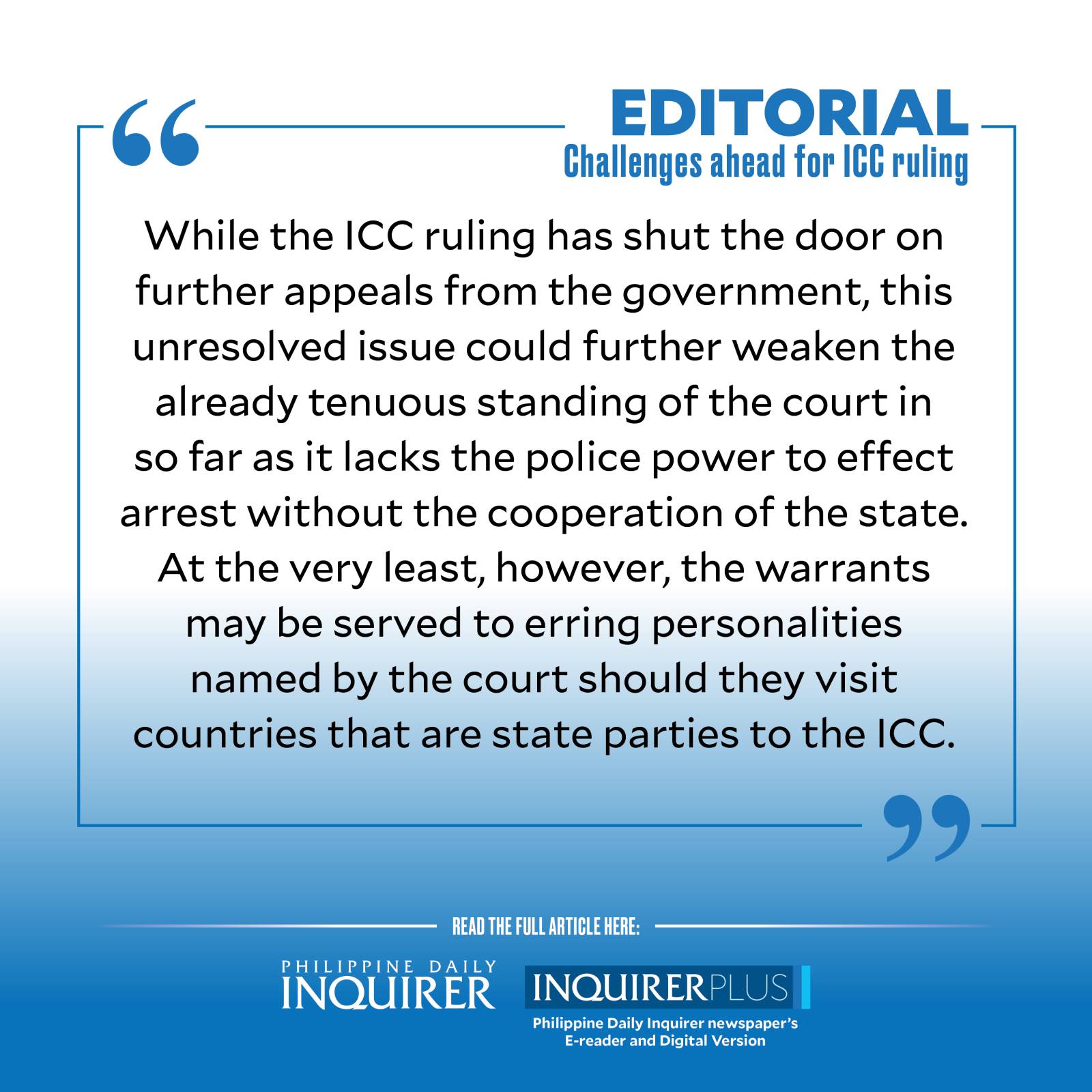Challenges ahead for ICC ruling

In a ruling welcomed by rights groups as “a significant step toward achieving justice for the victims and their families,” the International Criminal Court (ICC) on Tuesday rejected the Philippine government’s appeal for a stop to its investigation into drug-related killings under the Duterte administration.
The ICC’s majority decision dismissed the Office of the Solicitor General’s (OSG) main argument that the body had lost jurisdiction over the case when the Philippines’ withdrawal of its membership from the organization took effect in 2019. The international tribunal pointed out that the Philippines was still part of the ICC when the alleged abuses and reported extrajudicial killings were committed from Nov. 1, 2011 to March 16, 2019, covering killings when Rodrigo Duterte was mayor in Davao City and during his term as president.
The ICC began its preliminary probe of the killings in 2018 but paused it in November 2021 at the request of the Philippine government, which said it was investigating several hundred cases of controversial drug raids that had led to killings by the police and other state agents. In January, the body decided to pursue its investigation, with the OSG filing an appeal which the ICC junked early this week.
Predictably, Justice Secretary Jesus Crispin Remulla downplayed the impact of the ICC’s much anticipated ruling, saying that the government will not cooperate with the international court, and will not comply should it issue a warrant of arrest for individuals it found involved in the drug killings.
Instead of allowing itself “to be used in political agendas,” the ICC should not meddle in the country’s judicial processes and undermine its sovereignty, the justice official said. He suggested that the ICC pass on its evidence to the Philippine government if it wants certain individuals to be held accountable, so that “we will be the ones to prosecute those who committed crimes in our country.”
A stellar proposal on its face, but one that conveniently ignores how the government has had all this time since the previous administration to do just that—and bungled it. Recall that in its Jan. 26 decision to continue its investigation, the ICC noted that the Department of Justice (DOJ) had conducted only a “desk review” of 302 cases, which does not count as an investigative activity based on Article 18 of the Rome Statute, the law that created this international tribunal. Of 52 cases of supposedly shootout incidents between suspects and the police, the DOJ found liable only low-ranking officers, with only three cops in the 2017 Kian delos Santos case actually convicted in court. According to government records, some 6,000 suspects were killed in police operations under Duterte’s drug war, although rights groups have claimed that the actual death toll could reach 30,000.
Noting the country’s arguably selective justice system—with rare cases, like that of Remulla son Juanito’s drug possession charge navigating the normally torturous court process in less than three months—it’s no wonder that the families of victims of the Duterte drug killings consider the ICC ruling “a major blow against impunity and injustice,” according to Bayan Muna party list chair Neri Colmenares.
The international court “has clearly considered the lack of domestic recourse for the victims and the suffering of their grieving families, who are still denied recognition and reparation in their own country,” added the human rights advocates coalition In Defense of Human Rights and Dignity Movement.
For sure, despite the favorable ICC ruling, the road to reckoning is long and fraught with difficulties. Already, legal eagles have called for tempered expectations, with Inquirer columnist Raphael Pangalangan noting the possible challenge to the international court’s “temporal jurisdiction,” as expressed in the dissenting opinion of ICC judges Marc Perrin de Brichambaut and Gocha Lordkipanidze.
While the ICC ruling has shut the door on further appeals from the government, this unresolved issue could further weaken the already tenuous standing of the court in so far as it lacks the police power to effect arrest without the cooperation of the state. At the very least, however, the warrants may be served to erring personalities named by the court should they visit countries that are state parties to the ICC.
Fortunately, despite the government’s efforts to stonewall the ICC probe, the body can count on the testimonies of the victims’ families, the National Union of Peoples’ Lawyers said. The group added that the victims’ kin intend to communicate with the Office of the Prosecutor and the Office of Public Counsel for Victims, and have sought to be represented by an independent legal counsel, knowing that their submissions to the international body would remain confidential.
President Marcos, for his part, could enhance his political stock and global standing amid the fluid alliances among the country’s ruling families, by recommitting his administration to the rule of law, and ensuring that justice is ultimately served the victims’ families. This, even without being compelled by an international court.
















